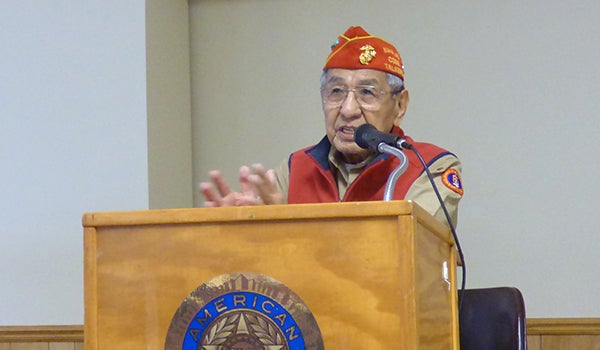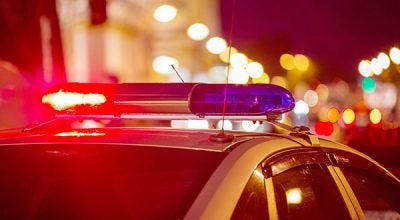Arizona veteran shares story of Navajo code talking in World War II
Published 8:42 am Wednesday, November 13, 2019
BUCHANAN — People can have a ringside seat to history this week with the visit of World War II Navajo Code Talker Peter MacDonald Sr. to Michiana. MacDonald, one of just a handful of Navajo Code Talkers still living, spoke Monday in Buchanan and will speak Wednesday in Dowagiac and Thursday at Notre Dame.
Monday’s snow did not deter more than a hundred people from attending MacDonald’s first Veterans Day presentation Monday morning at the Buchanan American Legion. Veterans Day is celebrated on the 11th hour of the 11th day of the 11th month each year to commemorate both the end of World War I and the service of all military veterans.
MacDonald, an Arizona resident and former Navajo Nation tribal chairman, held audience members spellbound in his hourlong speech, talking not only about the history of the Navajo Code Talkers in World War II but his own war experiences.
He also spoke of the importance of Veterans Day and the American flag.
“The flag doesn’t fly and wave with the wind but with the last breaths of every soldier who died defending it,” he said. “To me, the flag means freedom and liberty. We forget that this is a country that so many defended over so many years. We honor their selfless devotion, commitment, sacrifice and patriotism.”
Now almost 91 years old, he related how he was just 15 and a sixth-grade dropout when he enlisted in the Marines in 1943.
“My cousin had joined the Marines in early 1943, and he came home on furlough wearing a beautiful blue uniform,” he said. “I asked him, ‘how do I get one?’ and he said I’d have to join the Marines, but I had to be 17.
“He said I had to tell them that I was 17 so I went to the recruiting office and said I was 17,” he said. “I told them I didn’t have a birth certificate but that my cousin would vouch for me. It all came about because I liked the uniform he was wearing. What I did not know was anything about the Navajo Code School program.”
MacDonald went on to speak about how the code school was developed after the Japanese attack on Pearl Harbor in 1941 and the need to have a military code the enemy couldn’t break. Marine Corps officials gave approval to start the school in April 1942 and 29 Navajo young men took part in the first code school. More than 400 Navajos would be certified by the end of the war.
The young men who would become the Navajo Code Talkers were not told about the secret program when they were recruited and had to get through boot camp, combat training and community school before entering the top-secret code school. It was that first group of Navajo who developed and then memorized the special code using commonplace Navajo words.
MacDonald noted that no one — not the Japanese or even native Navajo speakers — were able to break the code those first young men developed. They took each letter of the English alphabet plus punctuation symbols and assigned them a word in Navajo. For example, they used the Navajo word for apple for the letter “a.” their word for bear for “b” and so on.
“The program started with 29 code talkers who came up with 260 code words,” he said. “By the end of the war, there were 400 code talkers who had memorized over 600 code words. People think we got together and sent messages in our own language. No, we developed the words and code.”
He emphasized the importance of the Code Talkers to the war effort. Navajo Code Talkers were there alongside other Marines in all the major battles of the Pacific starting with Guadalcanal and never had their code broken by the Japanese. In the height of battle, he said the code talkers would be working around the clock sending and receiving messages.
“The code was so good, it was the only official code never broken by the enemy,” he said. “That’s why it was so precious to the U.S. government. In the first 48 hours of the battle of Iwo Jima, Navajo Code Talkers sent over 2,000 messages. The messages were going through the air every minute nonstop.
“Without the Navajos, people said we would have never taken the island. One company was being shot at from three directions and they sent out a message for help. We could send it in 20 seconds when it would have taken 30 minutes to scramble it and send it in English.”
After the war, MacDonald said he and other code talkers had to keep secret what they did during the war for 23 years until the government acknowledged the top secret program in 1968.
“We saved hundreds of thousands of lives with the code and helped win the war in the Pacific,” he said.
MacDonald spoke Monday evening at Buchanan High School and was scheduled to speak to BHS students Tuesday afternoon. He will speak at 5:30 p.m. Wednesday at Southwestern Michigan College in the Lyons Theater on the Dowagiac campus and at 10 a.m. and 2 p.m. Thursday in the Jordan Auditorium at Notre Dame’s Mendoza College of Business. He will also be at Saturday’s Notre Dame-Navy football game.







